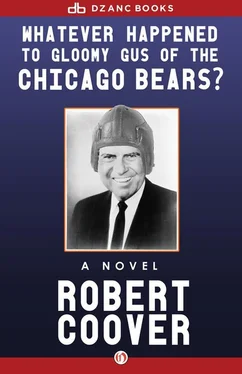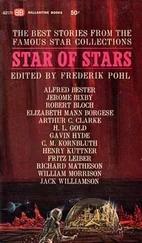Robert Coover - Whatever Happened to Gloomy Gus of the Chicago Bears?
Здесь есть возможность читать онлайн «Robert Coover - Whatever Happened to Gloomy Gus of the Chicago Bears?» весь текст электронной книги совершенно бесплатно (целиком полную версию без сокращений). В некоторых случаях можно слушать аудио, скачать через торрент в формате fb2 и присутствует краткое содержание. Год выпуска: 2014, Издательство: Dzanc Books, Жанр: Современная проза, на английском языке. Описание произведения, (предисловие) а так же отзывы посетителей доступны на портале библиотеки ЛибКат.
- Название:Whatever Happened to Gloomy Gus of the Chicago Bears?
- Автор:
- Издательство:Dzanc Books
- Жанр:
- Год:2014
- ISBN:нет данных
- Рейтинг книги:4 / 5. Голосов: 1
-
Избранное:Добавить в избранное
- Отзывы:
-
Ваша оценка:
- 80
- 1
- 2
- 3
- 4
- 5
Whatever Happened to Gloomy Gus of the Chicago Bears?: краткое содержание, описание и аннотация
Предлагаем к чтению аннотацию, описание, краткое содержание или предисловие (зависит от того, что написал сам автор книги «Whatever Happened to Gloomy Gus of the Chicago Bears?»). Если вы не нашли необходимую информацию о книге — напишите в комментариях, мы постараемся отыскать её.
Whatever Happened to Gloomy Gus of the Chicago Bears? — читать онлайн бесплатно полную книгу (весь текст) целиком
Ниже представлен текст книги, разбитый по страницам. Система сохранения места последней прочитанной страницы, позволяет с удобством читать онлайн бесплатно книгу «Whatever Happened to Gloomy Gus of the Chicago Bears?», без необходимости каждый раз заново искать на чём Вы остановились. Поставьте закладку, и сможете в любой момент перейти на страницу, на которой закончили чтение.
Интервал:
Закладка:
They cheer at that and swarm around Donald-son’s wagon to pick out the ones with the least bruises. Bernie, to get even, takes a banana, which is expensive. Donaldson is a surly old wretch and might have taken a cut at them with his horsewhip, but just then his old nag drops a load of manure, and he gets distracted picking it up, shoveling it into a bucket he keeps hanging from the side of the cart for the purpose. “Never throw nothin’ away,” he always says, and does so now. Bernie’s slide into second base with all its inner contradictions is still playing before my inner eye, and an idea comes to me suddenly for a little football piece, something to mark Gus’s performance down at Republic Steel. Not exactly what Leo had in mind maybe (I’m thinking of the lurch into freedom through all those grabbing and flailing restraints of the line, form emerging from chaotic matter), but it’s the first idea of any kind I’ve had in a month, I have to get home and sketch it out. I pay for the apples and the banana and buy myself a box of strawberries, thinking: I’m a rich man, I can eat like the Duke of Windsor and spend all my days modeling little football and baseball players out of mud and nails — and if Leo and the others cannot see what I’m doing, then that just shows that, as with Gloomy Gus, their lives are too narrow and segmented.
“How, after all you’ve been through, Meyer,” Leo once asked me, “can you fuck around making these goddamn emptyheaded palookas?”
“It’s social realism,” Simon said, defending me, and Leo laughed, thinking Simon was making a joke. But Simon’s too dense for humor; I supposed he was thinking of all those muscular Soviet posters (though in that respect, the Fascists are even better social realists than the Soviets). Either way, he was wrong about it. True, I believe in social realism, after a fashion, but I don’t think you can know it before you start. True dialectic means letting your own work teach you as you go along. Art as process, as Dewey says, as interaction, shared celebration. You have to expose yourself before the world will show itself to you: a truth from the Torah.
I often get criticized by my friends for the athletes I make (and Leo’s right in a way: my welding techniques often use suggestion more than solid matter, so the heads are often, quite literally, empty). They argue that professional American sports reflect the sickness of American society: the exploitation of players, manipulation of followers, the brutality and competitiveness of the game, the record-keeping mania and personality cults, even the hokum reenactment and reinforcement of the rags-to-riches mythology. Bigtime football especially enrages them. They hate the raw, naked aggression, the implicit imperialism in the battle for yardage, the dehumanizing uniforms and training schedules, the lionization of the bully, and the celebration of violence as a way of discovering the self.
“It stinks!” Harry has barked, getting emotional. “A shandeh, Meyer! A game of Fascists!”
“Or feudalists,” I once offered in reply. “King Quarterback and his knights in the backfield getting all the glory, the peasant serfs up on the line taking all the punishment…”
“Right! F’kucken Cossacks!”
“No wonder the game’s full of goddamn Irish Catholics,” Leo said. “Either they’re employed as cops heating up working stiffs, fighting for the Fascists in Spain, stealing us blind down at City Hall, or playing football for fucking Notre Dame!” We’ve all been down on Irish Catholics of late, though one of our best friends is — or was — a socialist priest named Clanahan who used to live and drink over on Larrabee; we haven’t seen him since the war broke out in Spain: had he been horrified by the Republican massacre of priests and nuns and returned to the fold, or has he, as rumored, joined the Basque Resistance in Bilbao? (Now collapsing under the weight of the Fascists’ superior arms, sad to say, yet another piece of today’s dismaying news mosaic.) Leo himself might once have been a Catholic for all we know, depending on whether his real name is Leopold, Leonardo, León, Leonid, or Leonides, all of which — and more — I’ve known him to use at one time or another.
“Shit, the silly ball don’t even bounce straight!” Jesse put in. “It’s a insult to common sense!”
“Good point!” Leo laughed. “Bunch of damn perverts!”
“F’kucken nihilists!”
Oddly, nobody ever complains about the jugglers and dancers, which belong to the same set of images: bodies in motion, for me the central thing about life. I don’t miss the dead gods and vanished mysteries; motion is all the magic I need. And these figures of mine are real sentient bodies at full stretch — I don’t like amoebic or inanimate shapes, I like something that knows itself and tests itself. The first print I ever owned was one of Remington’s “Western Types.” Remington is popular now for the wrong reasons. I’m not interested in “the American scene,” the current “quest for a usable past,” local color, what Harry calls “all that acreage on canvas, poor art for poor people.” What excited me about Remington — and still does — is the way everything in his paintings, even the landscapes, expresses a kind of contained dynamic, some inner — perhaps tragic — force struggling, through matter, to free itself. I like things that move from the inside out, not things you look at from the outside in. I’m no voyeur, I hate the Impressionists, and was sorry when Picasso turned to Cubism, which is a hall-of-mirrors trick, not revelation — he could learn something right now from guys like Hopper and Benton. Expression is everything for me, and working as I do for the most part with figures only about a foot high, I feel that athletes, less likely to rigidify into archetypal positions than, say, workers or warriors, leave me more room to swing.
Also there’s the ball. Boxers, pole-vaulters, and swimmers also work at full stretch, but I’m less drawn to them. The strange ambiguity of the ball fascinates me, so much so that it never appears in my sculptures. It often seems to be there, but it isn’t. This creates a strange tension, especially with the jugglers, where the longing, the anticipation, seem more intense. Yet the jugglers always turn out too flat somehow, too static. I prefer the greater dynamism of the ballplayers, the outflung limbs, the twisted torsos, the seeming defiance of gravity and the collision of forces: they all seem actually to move, because without the logic of motion they make no sense. And football is not about violence or atavistic impulses, like Harry says, it’s about balance. The line of scrimmage is a fulcrum, not a frontier, the important elements of football being speed and weight. The struggle is not for property, it’s for a sudden burst of freedom. And the beauty of that. In football, as in politics, the goal, ultimately, is not ethical but aesthetic.
Of course, I admit, most footballers are probably ignorant of all this. All but the odd exception go banging unreflectively through football and then life, vaguely nostalgic at the end for something beautiful they had and lost, but unable when called upon at their testimonial dinners to put their fingers on it. This is true of all of us. One of the main tasks of socialism has to be to give all men what artists take for granted: time and incentive for reflection. Capitalism has made us overvalue action as power (the early bird gets — and consumes — the worm, and that’s the beginning and end of it: a plate of worms), and contemplation has become, not merely a kind of unpatriotic idleness, but socially and psychologically hazardous as well.
Which is one risk Gloomy Gus never took. The only All-American in the history of his little college, the first Heisman Trophy winner (I heard at the hospital today from the sportswriter doing that retrospective piece on him that because of his involvement in the Memorial Day riot, there’s a move underfoot now to erase his award from the books — but can history be erased? yes, yes, it always is, in fact that’s the first thing that happens to it…), an All-Pro halfback for the NFL Chicago Bears, and it still isn’t clear he ever understood what the game is all about at the most fundamental level. Or ever wished to know. Certainly, he had not been attracted to freedom, mystery, beauty — if anything, he was frightened by such things. He apparently lacked any capacity for joy, so how could he have known these other things even if he’d encountered them? He would probably have registered them as some kind of vexatious disorder, and added yet another calisthenic to his schedule.
Читать дальшеИнтервал:
Закладка:
Похожие книги на «Whatever Happened to Gloomy Gus of the Chicago Bears?»
Представляем Вашему вниманию похожие книги на «Whatever Happened to Gloomy Gus of the Chicago Bears?» списком для выбора. Мы отобрали схожую по названию и смыслу литературу в надежде предоставить читателям больше вариантов отыскать новые, интересные, ещё непрочитанные произведения.
Обсуждение, отзывы о книге «Whatever Happened to Gloomy Gus of the Chicago Bears?» и просто собственные мнения читателей. Оставьте ваши комментарии, напишите, что Вы думаете о произведении, его смысле или главных героях. Укажите что конкретно понравилось, а что нет, и почему Вы так считаете.












